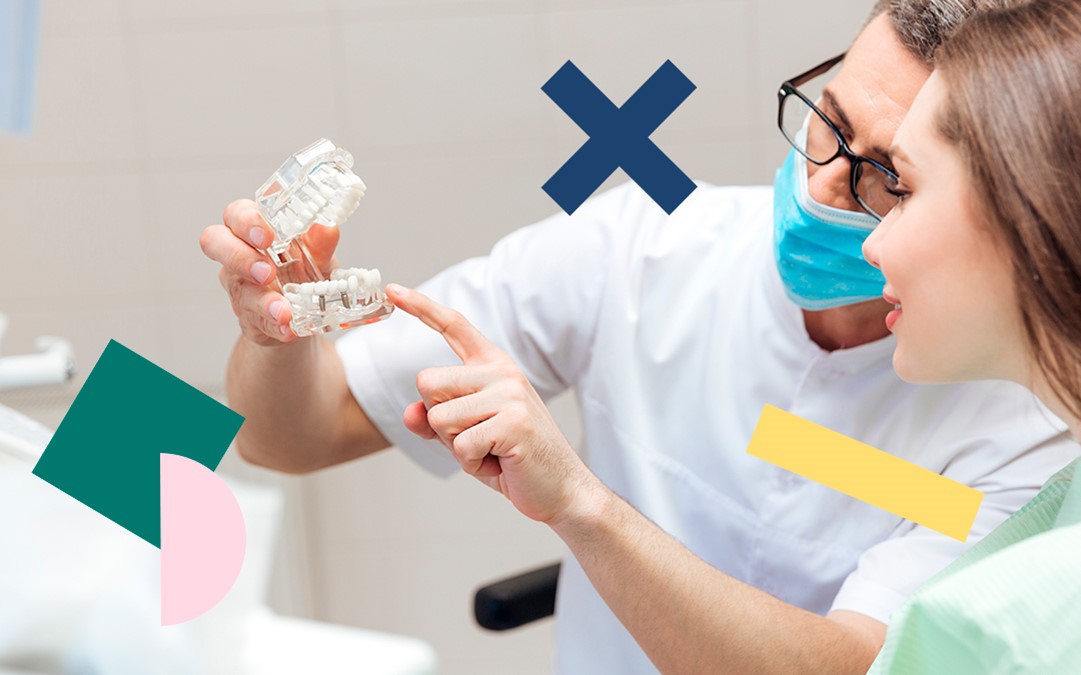Thanks to the placement of a dental prosthesis, today it is possible to restore lost or damaged teeth, fully recovering their functionality. To solve all types of oral problems, there are different types of dental prostheses adapted to the needs of each patient.
In general, dental prostheses are classified into two main groups: fixed and removable. Which is better? We analyse the advantages offered by each one of them to facilitate a correct choice in each particular case.
What is a dental prosthesis?
In dentistry, any element whose objective is to replace the function of one or more missing or defective teeth is known as a dental prosthesis. These devices include implants, crowns, bridges, dental veneers, and dentures.
Dental prostheses can be removable or fixed. When deciding to choose one or the other, it is necessary to consider the number of teeth to be replaced and carry out a prior assessment by a qualified professional.
Types of dental prostheses
The specialty in charge of the placement of detailed prostheses is known in dentistry as prosthodontics. This includes the placement of all types of prostheses that replace the normal function of damaged teeth for different reasons.
When a patient has lost a part of their teeth, the placement of a dental prosthesis is an excellent help both on a functional and aesthetic level and the dentist will be responsible for recommending the patient the most appropriate type of prosthesis according to their condition.
Fixed dental prosthesis
Fixed dental prostheses are those that are permanently placed in the oral cavity. Depending on the condition, they are attached directly to other natural teeth or to the jawbone.
A fixed dental prosthesis has the advantage that the patient completely forgets that he is wearing it.
It is a device that adapts naturally to the mouth, recovering the ability to chew almost as if it were the original teeth.
Like natural teeth, fixed prostheses require daily care and maintenance. To avoid damage, proper oral hygiene is essential for the care of the original teeth and the prostheses that accompany them.
Removable dental prosthesis
Removable dentures are a substitute for natural teeth that can be removed and inserted when necessary. The treatment for their placement is cheaper, but in some patients, they can be more uncomfortable and unstable.
The main reason why the placement of a removable dental prosthesis is recommended is the lack of thickness or consistency in the jawbone. If there is not enough bone or there is some pathology, it is not possible to place a fixed prosthesis, so the best option is to use an alternative method.
Removable dental prostheses can be complete or partial and can be made following the classic removable way, or they can be placed whenever the patient’s condition allows it, such as a denture on implants, known as a semi-fixed prosthesis. The latter is attached to the maxillary bone on an anchor, with the possibility of removing it when necessary, providing greater support and comfort.
Which dental prosthesis is better?
The choice of one type or another of dental prosthesis will depend on the patient’s situation. For this, a qualified prosthodontic professional will make a recommendation to the patient after an examination and precise diagnosis of the situation of their oral cavity.
In this examination, the number of teeth to be replaced must be taken into account, as well as the initial state of the maxillary bone and the buccal mucosa. If necessary, it is possible to do a bone graft if the jaw bone is thin, or the previous recovery of damaged gums.
Tips for choosing a dental prosthesis
There are several factors to take into account when choosing the most suitable dental prosthesis for each patient. From the budget to the aesthetic aspect of the care of these, there are many considerations before making the final decision.
Cost
The type of dental prosthesis determines the total budget of the treatment. One of the factors that directly influence the choice of a fixed or removable dental prosthesis is its price. This may be higher when the treatment requires some type of complicated intervention, such as surgery or intervention by a specialized professional.
Initial situation of the patient
After analysing the oral health status, it will be apparent which option will best suit the patient. Taking into account the number of pieces to be replaced, the specific location of the lost or damaged teeth, and the initial space of the gum and jawbone, the treatment will be adapted to prioritize comfort and quick recovery.
Expected results
What are the results that the patient expects? To some people, aesthetics are a very important factor to take into account. It is not so important when the parts to be replaced are in the background, the priority here is to establish or maintain functionality whilst chewing.
Professional specialization
Depending on the professional assisting the patient, their specialty may be focused on the placement of certain types of dental prostheses. For this reason, it is important to compare opinions and recommendations, to find the solution that best suits each case.
Dental prosthesis care
The type of care and maintenance of each type of dental prosthesis is different. While removable prostheses are easier to clean when removed from the mouth and washed separately with specific products for dental prostheses, the care of fixed prostheses requires a more thorough cleaning with different ones as recommended for oral hygiene of the teeth. original teeth.
Consult with a professional expert in prosthodontics which is the best alternatives, and choose the one that best suits you among the models of fixed or removable prostheses that currently exist. Effective oral hygiene around fixed prostheses is extremely important during treatment and after.
BIBLIOGRAPHY
Bone dimensional variations at implants placed in fresh extraction sockets: a multilevel multivariate analysis
Implants placed in fresh extraction sockets in the maxilla: clinical and radiographic outcomes from a 3-year follow-up examination








